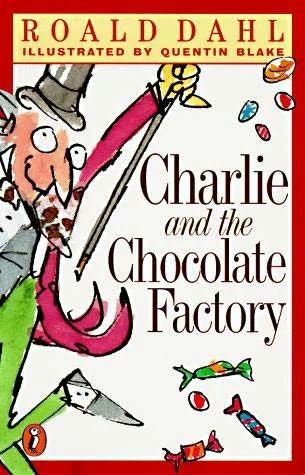 |
| Alfred A. Knopf |
But, admittedly, I've never read the books. Which is a shame since I picked up Charlie and the Chocolate Factory yesterday and, honestly, I love it.
I'm only a few chapters into it, but I love how weird and zany it is, I love how it alternates between absurd and serious, and I love how Roald Dahl creates such intriguing characters. Sure the other four children are rather terrible (oh, who am I kidding? They're beastly, as Grandma Josephine aptly puts it), but they're such crazy caricatures that I find them interesting and, truthfully, they make Charlie Bucket shine a little brighter.
Although I've enjoyed reading Charlie and the Chocolate Factory immensely, I never realized that Dahl actually portrays rather horrific events in his novel. For instance, I was struck to the quick when I realized how terribly poor Charlie and his family is. I mean, I've watched the movies and I've surely realized that the Bucket family is impoverished; however, I didn't realize that Charlie Bucket was literally starving:
"And every day, Charlie Bucket grew thinner and thinner. His face became frighteningly white and pinched. The skin was drawn so tightly over the cheeks that you could see the shapes of the bones underneath. [...] And now, very calmly, with that curious wisdom that seems to come so often to small children in times of hardship, he began to make little changes here and there in some of the things that he did, so as to save his strength. In the mornings, he left the house ten minutes earlier so that he could walk slowly to school, without ever having to run. He sat quietly in the classroom during recess, resting himself, while the others rushed outdoors and threw snowballs and wrestled in the snow. Everything he did now, he did slowly and carefully to prevent exhaustion."Those words hit me like a punch in the gut.
I never went hungry during my childhood. I was lucky to have parents who had the means and the opportunity to provide for me, so I never experienced hunger like Charlie Bucket does in Charlie and the Chocolate Factory. In fact, hunger - more accurately, starvation - isn't something I regularly confront in my reading. It's such a foreign experience to feel such desperate, visceral emotion when I'm reading, to recognize something tragic unfolding within what I once considered a happy story.
It's surprising and it's heartbreaking.
Luckily, I've gotten to the part where Charlie finds the Golden Ticket (I'm not spoiling anything, really. I mean, it wouldn't be Charlie and the chocolate factory without him winning a Golden Ticket to enter the chocolate factory), so I find tragedy is balanced with a heaping dash of fortune. It's hard not to be happy for Charlie when he finds the fifth and final ticket. If anyone deserves such an amazing opportunity, it's Charlie Bucket.
No comments:
Post a Comment